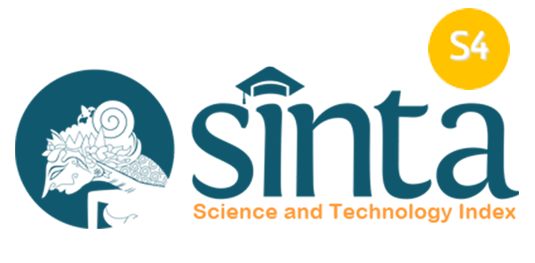Analyzing Junior High School Students' Cognitive Load in A Science Subject: A Case Study
Abstract
Keywords
Full Text:
PDFReferences
Anderson, J. R., Bothell, D., Byrne, M. D., Douglass, S., Lebiere, C., and Qin, Y. (2004). An integrated theory of the mind. Psychological Review, 111(4), 1036–1060.
Chandler, P., and Sweller, J. (1991). Cognitive load theory and the format of instruction. Cognition and Instruction, 8(4), 293–332.
Curum, B., and Khedo, K. K. (2021). Cognitive load management in mobile learning systems: principles and theories. Journal of Computers in Education, 8(1), 109–136.
De Jong, T. (2010). Cognitive load theory, educational research, and instructional design: Some food for thought. Instructional Science, 38(2), 105–134.
Hong, J. C., Hwang, M. Y., Tai, K. H., and Tsai, C. R. (2017). An exploration of students’ science learning interest related to their cognitive anxiety, cognitive load, self-confidence and learning progress using inquiry-based learning with an iPad. Research in Science Education, 47(6), 1193–1212.
Jiang, D., and Kalyuga, S. (2020). Confirmatory factor analysis of cognitive load ratings supports a two-factor model. The Quantitative Methods for Psychology, 16(3), 216–225.
Kalyuga, S. (2011). Cognitive load theory: How many types of load does it really need? Educational Psychology Review, 23(1), 1–19.
Kalyuga, S., Ayres, P., Chandler, P., and Sweller, J. (2003). The expertise reversal effect. Educational Psychologist, 38(1), 23–31.
Kennedy, M. J., and Romig, J. E. (2024). Cognitive load theory: An applied reintroduction for special and general educators. TEACHING Exceptional Children, 56(6), 440-451.
Klepsch, M., and Seufert, T. (2020). Understanding instructional design effects by differentiated measurement of intrinsic, extraneous, and germane cognitive load. Instructional Science, 48(1), 45–77.
Krieglstein, F., Beege, M., Rey, G. D., Sanchez-Stockhammer, C., and Schneider, S. (2023). Development and validation of a theory-based questionnaire to measure different types of cognitive load. Educational Psychology Review, 35(9), 1–35.
Leahy, W., Chandler, P., and Sweller, J. (2003). When auditory presentations should and should not to be a component of multimedia instruction. Applied Cognitive Psychology, 17(4), 401–418.
Paas, F., Renkl, A., and Sweller, J. (2003). Cognitive load theory and instructional design: Recent developments. Educational Psychologist, 38(1), 1–4.
Park, D. C., and Reuter-Lorenz, P. (2009). The adaptive brain: Aging and neurocognitive scaffolding. Annual Review of Psychology, 60, 173–196.
Rahmat, A., and Hindriana, A. F. (2014). Beban kognitif mahasiswa dalam pembelajaran fungsi terintegrasi struktur tumbuh berbasis dimensi belajar. Jurnal Ilmu Pendidikan, 20(1), 66–74.
Rahmat, A., Soesilawaty, S. A., Nuraeni, E., and Hidayat, T. (2017). Controlling cognitive load of high school student in biology class. Article in Journal of Science Education, 18(2), 105–108.
Ratnasari, G. (2023). Analisis beban kognitif dalam kemampuan pemahaman konsep matematis siswa. Jurnal Didactical Mathematics, 5(2), 136–144.
Sabilla, Z., Ridwan, A., and Yusmaniar, Y. (2019). Hubungan antara pemahaman konsep dengan beban kognitif siswa pada materi hidrolisis garam. JRPK: Jurnal Riset Pendidikan Kimia, 9(1), 46–51.
Santoso, E. A. (2023). Penerapan metode pacing dan dual processing untuk mencegah beban kognitif berlebih siswa dalam pembelajaran fisika. INKUIRI: Jurnal Pendidikan IPA, 12(3), 192–200.
Sweller, J. (1994). Cognitive load theory, learning difficulty, and instructional design. Learning and Instruction, 4, 295–312.
van Merriënboer, J. J. G., and Sweller, J. (2010). Cognitive load theory in health professional education: Design principles and strategies. Medical Education, 44(1), 85–93.
DOI: https://doi.org/10.17509/ijotis.v5i1.76267
Refbacks
- There are currently no refbacks.
Copyright (c) 2024 Universitas Pendidikan Indonesia

This work is licensed under a Creative Commons Attribution-ShareAlike 4.0 International License.
Indonesian Journal of Teaching in Science (IJoTIS) is published by Universitas Pendidikan Indonesia (UPI)
 Indonesian Journal of Teaching in Science
Indonesian Journal of Teaching in Science



